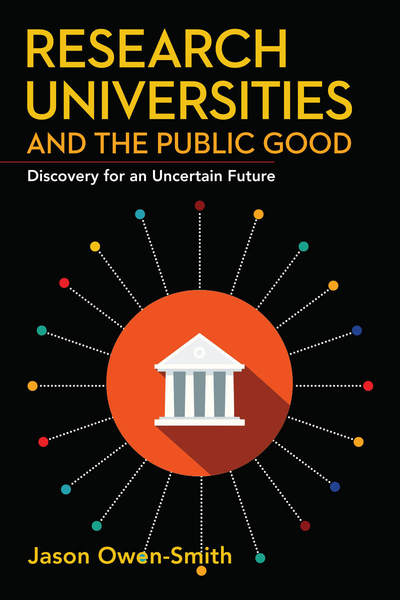
2018
232 pages.
from $30.00
Paperback now $15.00 (50% off)
Hardcover ISBN: 9781503601949
Paperback ISBN: 9781503615038
Ebook ISBN: 9781503607095
In a political climate that is skeptical of hard-to-measure outcomes, public funding for research universities is under threat. But if we scale back support for these institutions, we also cut off a key source of value creation in our economy and society. Research Universities and the Public Good offers a unique view of how universities work, what their purpose is, and why they are important.
Countering recent arguments that we should "unbundle" or "disrupt" higher education, Jason Owen-Smith argues that research universities are valuable gems that deserve support. While they are complex and costly, their enduring value is threefold: they simultaneously act as sources of new knowledge, anchors for regional and national communities, and hubs that connect disparate parts of society. These distinctive features allow them, more than any other institution, to innovate in response to new problems and opportunities. Presenting numerous case studies that show how research universities play these three roles and why they matter, this book offers a fresh and stirring defense of the research university.
About the author
Jason Owen-Smith is Professor of Sociology, Executive Director for the Institute for Research on Innovation & Science (IRIS), Barger Leadership Institute Professor and Director, and Research Professor in the Institute for Social Research, Survey Research Center at the University of Michigan.
"A well-argued, data-rich defense of the irreplaceable role of American research universities—not only in science, engineering, and education, but in our national life. Now, more than ever, we need this book's deep appreciation of research universities' power to be sources, anchors, and hubs for 'beautiful accidents' in learning and innovation."
—Kei Koizumi, American Association for the Advancement of Science
"In this book, Jason Owen-Smith integrates innovative with previously disarticulated data to measure the outputs of our nation's research universities, institutions that prepare us for an increasingly complex future. In so doing, he compellingly reveals the mechanisms and pathways that produce positive societal results."
—Mary Sue Coleman, President of the Association of American Universities
"Less than 3% of all universities conduct 90% of funded research. This important book offers a careful, empirical account of how these research universities work – and their crucial contributions as anchors for communities, regions, and industries, and hubs for flows of knowledge and social connections. This is important reading not just to understand higher education, but to understand America's future."
—Craig Calhoun, University Professor of Social Sciences, Arizona State University
"Research Universities and the Public Good provides a strong argument for the importance of research universities...Presenting numerous case studies that show...why [research universities] matter, this book offers a fresh and readable defense of the American research university."––Maryann P. Feldman, Academe
"The current discourse on universities, which narrowly conceives of them as mechanism for delivering degrees to students, desperately needs the message that Owen-Smith delivers here....[A] powerfully framed contribution to the literature on U.S. higher education"
—David F. Labaree, American Journal of Sociology
"This book is a timely reinforcement of the importance of research universities based on the public value they generate....[It] should interest researchers and policy makers concerned with innovation, growth, and how we can best address global challenges of the future."
—Anna Valero, Journal of Economic Literature
"In this beautifully crafted book, Owen-Smith explores the critical and central role that research universities play in the modern economy....This book should be of great interest to both policy makers and academic researchers interested in understanding the research university's role in modern innovation ecosystems and in our economy and society more broadly."
—Wesley D. Sine and Xirong (Subrina) Shen, Administrative Science Quarterly